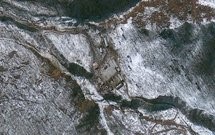 The reverberations of North Korea’s third and latest nuclear test conducted on 12 February 2013 can be felt across Northeast Asia, tending to suggest that North Korea’s nuclear ambitions may never be deterred after all. Ever since signing of Agreed Framework between the US and the Democratic People’s Republic of Korea in 1994, until it effectively broke down in 2003, Pyongyang’s nuclear defiance has continued unabated with the pattern of seemingly stringent international sanctions being unable to prevent the North Korean regime from developing a full-fledged nuclear warhead along with its means of delivery.
The reverberations of North Korea’s third and latest nuclear test conducted on 12 February 2013 can be felt across Northeast Asia, tending to suggest that North Korea’s nuclear ambitions may never be deterred after all. Ever since signing of Agreed Framework between the US and the Democratic People’s Republic of Korea in 1994, until it effectively broke down in 2003, Pyongyang’s nuclear defiance has continued unabated with the pattern of seemingly stringent international sanctions being unable to prevent the North Korean regime from developing a full-fledged nuclear warhead along with its means of delivery.
The United Nations Security Council (UNSC) is reportedly taking steps to adopt a new resolution that would elevate existing sanctions against North Korea. Additionally, South Korea and the US are considering imposition of independent, supplementary sanctions following the UNSC’s decision on future sanctions. Sanctions, in fact, play a critical tenet of the larger bilateral equation between Washington and Pyongyang and there is a legislative basis for US economic sanctions against North Korea.
A facet that needs to be underscored is that contrary to most commonly expressed views, the United States does not maintain a comprehensive embargo against North Korea. The US government does not prohibit travel to North Korea, or for that matter does not deny trade in basic goods. However, trading activity between the two countries is minimal, mostly limited to food, medicine, and other humanitarian-related goods. According to the US Department of State, Foreign Operations, and Related Programs Appropriations Act, North Korea is denied direct foreign aid, economic support funds (ESF) for energy-related programs, and direct loans, credits, insurance and guarantees of the Export-Import Bank.
When it comes to defining its trade status, North Korea does not possess any advantageous position and is denied luxury goods and trade financing. The US Department of Commerce has placed North Korea among the two most restricted country groups for exports in that imports require a license from the US Treasury Department’s Office of Foreign Assets Control, and using a North Korea-flagged vessel for any transaction, whatsoever, remains strictly prohibited. Moreover foreign aid to North Korea is nominal, with most of it being limited to refugees fleeing North Korea, NGOs working towards promotion of democracy, human rights, and issues pertaining governance. Besides, minimal aid is available in the form of emergency food aid and related to halting and consequent dismantlement of North Korea’s nuclear weapons programme infrastructure.
In so far as arms sales and transfer of arms is concerned, they remain fully denied as per US jurisdiction. Given that North Korean entities have been found to be in violation of US missile non-proliferation laws under Section 73 of the Arms Export Control Act and Section 11B of the Export Administration Act, imposition of sanctions becomes mandatory. The severity of the sanction depends on the type of material or technology that is said to have been transferred. When North Korea conducted its nuclear test in 2006, President George W Bush exercised his authority in order to cut off all foreign aid except humanitarian and food aid, deny sales or transfers of defence articles and defence services, deny foreign military financing, deny credit underwritten or provided by government coffers, withhold US support in the international financial institutions, deny export licenses for dual-use items, and withhold Export-Import Bank support, as per a US Congressional Research Service report.
Significantly the Bush administration also denied export licenses for items on the US Munitions List (USML). Sanctions include a denial of contracts with agencies of the US government, denial of licenses for items on the USML and, at most, denial of all licenses for importing into the United States for the foreign person or entity. Given that North Korea is a non-market economy, all activities related to the North Korean government were also sanctioned when entities in North Korea were found to have engaged in proliferation activities as per US law. The prohibitions on direct foreign aid to North Korea also make it ineligible for Millennium Challenge Account programs.
Despite these stern and rigorous sanctions, nuclear diplomacy as well as attempts to deter North Korean dictators, both Kim Jong-il and Kim Jong-un have failed miserably. In stark contrast to the UN trade sanctions, it was assessed that disruptions to the financial flows associated with Banco Delta Asia (BDA), wherein accounts at BDA were associated with activities relating to missile proliferation, unrecorded gold sales and Kim Jing-il’s political funding, have not gone unnoticed. In fact, during the six-party talks, North Korea expressed a strong desire in resolving the BDA issue.
In this reference, the latest nuclear test by North Korea comes across as a brutal riposte against Western sanctions. Tighter sanctions imposed by the West and economic sanctions forced by the UN have barely had any effect on North Korea’s trade in luxury goods with its largest trade partner, China. For that matter, the Chinese take on sanctions against North Korea represents mere tokenism given that its exports to North Korea have risen from $ 300 million during the decade of the 1990s to over $ 2 billion as of today. It needs to be established that as long as China continues to remain North Korea’s primary patron and benefactor in every sense of the term, the sanctions shall not serve the desired purpose, however much North Korea gets threatened with dire retribution.
By Special Arrangement with The Centre For Land Warfare Studies (CLAWS) (http://www.claws.in)